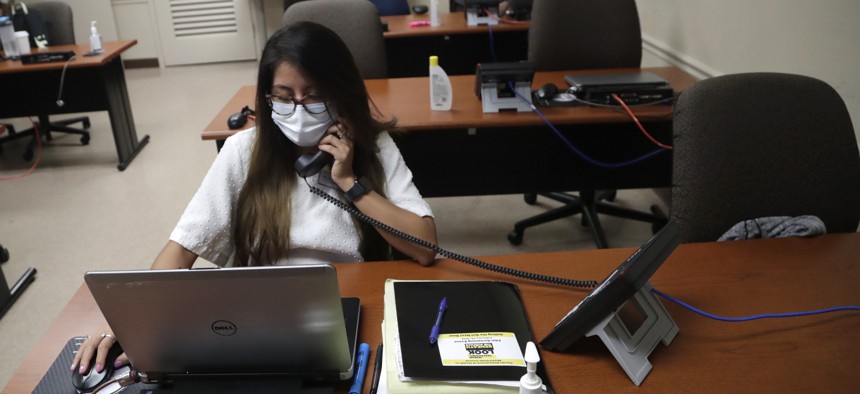Connecting state and local government leaders
COMMENTARY | Here’s how to create a qualified contact tracing workforce in your community.
Contact tracing is widely acknowledged as a key component of any community’s strategy to contain the spread of Covid-19. While there’s been much discussion about the lack of capacity to meet the estimated need of 100,000 workers and lack of available funding for these new workers, much less has been said about where and how to source these positions.
Our disaster recovery work has provided insights into how state and local governments can build a strong foundation to recruit and scale a competent contact tracing workforce.
Identify potential candidates with comparable skills
The U.S. needs to hire tens of thousands of contact tracers in short order. But most states don’t have an untapped army of people with public health degrees. So how do you screen and recruit candidates who have the specific knowledge, skills and abilities of a contact tracer?
The Centers for Disease Control and Prevention has published guidance on the basic knowledge and skills that contact tracers need to do their jobs effectively. Chief among them: excellent interpersonal skills and cultural sensitivity.
Trustworthy people who demonstrate empathy and cultural competency appropriate to the local community are critical to the success of a contact tracing program. Given the economic downturn, many unemployed or underemployed workers could help fill workforce gaps. We have seen in past disasters that many out-of-work individuals are likely eager to learn new skills and get back to work. For example, hospitality industry workers—a group who have been particularly hard hit by job cuts—may provide a reliable pool of candidates. Agencies could benefit from their strong interpersonal skills required for front-of-house hotel and restaurant roles.
Develop detailed protocols—and be prepared to evolve them
Before contact tracers can get to work, agencies will need to develop a detailed, written set of protocols for them to follow. These protocols or rules of engagement, should cover everything from confidentiality practices to available resources for referral to HIPAA privacy regulations.
As we’ve learned from our disaster response work at the federal, state and local levels, even the best program designs will anticipate only 60-80% of potential issues. Once your program is up and running, protocols will need to evolve to address unforeseen issues and needs. A mechanism must be in place that enables the identification of new patterns and developments in the field quickly, revises current protocols accordingly and informs subsequent staff training to implement the new protocols. While effective protocol development requires a heavy upfront investment, it’s well worth the effort.
Prioritize training
Building efficient and sustainable contact tracing programs requires developing training initiatives that incorporate community context. There are many basic and free training tools, such as the Association of State and Territorial Health Officials’ entry-level contact tracer course, that can get you started. From there, you will need to layer on your state- and local-specific training materials.
As you design your contact tracing training program, keep in mind some best practices from our work in disaster response and recovery:
- Use a mix of training strategies to deliver the best results and appeal to all learning styles. Right now, most training will need to be done remotely. Trainers can create channels that cater to different learning styles through e-learning, mobile learning, virtual instructor-led training, online job aids, roleplay, coaching/mentoring, training videos and games.
- Understanding training needs is key. Doing analysis up front of what skills and knowledge improvements are needed will help ensure your training addresses those gaps. This step can be as simple as a discussion with a program leader or subject matter expert, or more involved, by collecting data through surveys, interviews or focus groups. Once you identify gaps, you can design your training to address them.
- Assess results. Using performance metrics, pre- and post- assessments, surveys or other tools, you can determine what did or did not work well, and how to improve the training in the future.
Lean on technology to analyze data, spot trends and strengthen operations
Technology will be a force multiplier in identifying trends and potential hot spots. When choosing a technology platform, it’s essential to select one that is powerful and intuitive enough to organize and track the work of this expanded workforce. The platform should also facilitate workload management and call management across your expanded team.
Strong managers will enlist digital platforms and tools to help balance cases across the team of contact tracers, identify ways protocols need to be adjusted, assign complex cases to experienced tracers and conduct quality assurance.
People are just as important as the technologies that power contact tracing. We know from our work in communities devastated by natural disasters that building trusted relationships with a dedicated point-of-contact—in this case, the contact tracer—is critical to helping individuals navigate the process successfully. Enlisting interactive voice response can help route a person to the tracer they started working with in order to maintain or build trust along the way.
It’s also worth building a strong analytics team that can use technology to identify data patterns and pinpoint hotspots, outbreaks and clusters. This will help you to quickly mobilize resources into the community to provide services to those that need them and prevent further spread. Furloughed or currently unemployed people with quality assurance and data analytics experience can fill these crucial roles.
While this crisis is new, state and local governments have a public health infrastructure to lean on for contact tracing programs. By following the guidance outlined above, you ‘ll be able to put a qualified army of contact tracers into the field. More importantly, you'll be able to get your community back to work.
Andrew Zehe is a Senior Vice President, Justice and Community Development at ICF. Maya Larson is a Senior Director, Disaster Management at ICF. Elizabeth Vaughn is a Senior Research Scientist at ICF.

NEXT STORY: The Forgotten Governor’s Race



